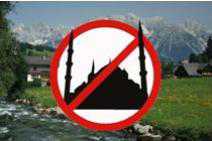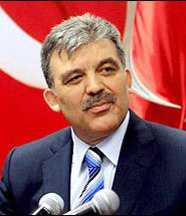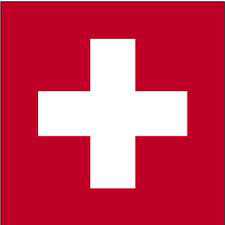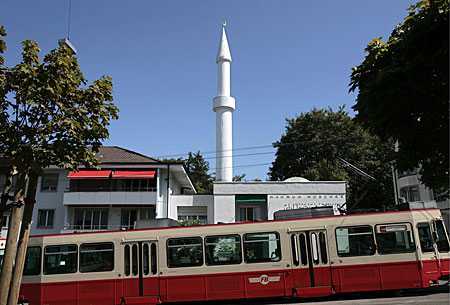 By Liz Fekete
By Liz Fekete
1 December 2010, 4:00pm
The IRR News Service met up with three members of Foreign Architects Switzerland (FAS) who are challenging the Swiss ban on minarets.[1]
LIZ Fekete: You are in London, at the invitation of the Architecture Foundation, to speak at a forum on architecture’s political and social role in the context of the Swiss ban on minarets and the hysteria in the US over plans to site a new Islamic cultural centre in downtown New York City.[2] First, could you tell us a little bit about FAS?
Charlotte: We are a collective of architects from different backgrounds living in Switzerland fed up with the general passivity within the architecture profession who steer away from any controversy or political debate and adopt a low profile. Switzerland is often portrayed as a paradise, but from where we were standing there is a lack of innovation. So the whole purpose of FAS is to provide, often in a playful way, a platform for alternative ideas and projects that would never be considered in the brain-dead, incestuous architectural media of Switzerland. Oh, yes, and we are also friends. The Collective is a way for us to come together – we are only a few individuals and FAS is not our main occupation.
So how did you react when news came through that the Swiss People’s Party (SVP)[3] had been successful in its referendum to prohibit the construction of minarets?
Charlotte: When we heard about the minaret ban we felt very angry. We were angry because it was clearly discriminatory. The whole talk of Islamicisation was just crazy (there are only four mosques with minarets in the whole of Switzerland). And all that the referendum proved was the level of ignorance and fear that exists in Switzerland about a different culture, Islam. But we were also angry as architects. We felt this as an attack on us as architects, on our field. And despite this, the architectural scene was not responding. This also made us very angry. The only opposition came from civil society in the form of demonstrations, as well as a few individual acts, such as that of Guillaume Morand, the owner of a shoe company, who defied the referendum by extending the chimney on the top of his warehouse near Lausanne to give it the shape of a minaret.
So what did you decide to do?
Charlotte: We decided that if we were to address the situation we needed to take architecture and turn it into a weapon. We launched a counter- competition – to design an Islamic Centre. And for this competition we adopted the slogan ‘Save the Honor of Architecture, Save the Honour of Switzerland’.
Lorenz: We chose a site which has a traditionally Swiss landscape. It’s a visitor’s centre up on a hill, with lots of churches and a leisure lake. You have to visualise this. In the middle of a residential area, directly adjacent to a Greek Orthodox church, swimming facilities and an active bar scene. It would be impossible to camouflage a mosque on such a site. The counter-competition asked entrants to come up with a design that would, in the words of the competition tender, ‘promote interaction and dialogue in the community’. You also have to understand that the site, the Kronenwiese along the Limmat River was already controversial. Homeless people and a soup-kitchen had been evicted from the area to make way for a new housing development. So the counter-competition was in itself a political statement, asking the profession to re-evaluate its priorities and raising pertinent questions about multiculturalism in Switzerland.
Jesse: We invited architects to submit a design which would not only give Muslims a place to pray and meet, but provide an open meeting point between cultures. The design would include a mosque, a hamam, an Aula, space for lectures, exhibitions and a theatre, multipurpose rooms for men and women, offices, library, coffee shop and restaurant, as well as a public park and playground.
And what was the reaction?
Jesse: Well, in terms of the general public the reaction was small. But the most important thing was that we actually got entries. Architecture if rather non-political and this is one of the reasons we founded FAZ. And we got so many really thoughtful entries which helped us achieve our aim – to catalyse a much needed discussion within the architectural community about cultural differences.
Charlotte: Some of the entrants challenged stylistic norms, others went so far as to suggest that religion, as well as architectural style, is bound to evolve in a changing cultural climate. From these entries we picked out three which addressed different issues of design. The first was very open, the second quite aggressive, challenging codes on mosques and the third rather tongue-in-cheek, with a minaret. And through this we really did achieve our aim to catalyse discussion, which we also did via our facebook page and our fanzine that we sent to about 250 architects, university chairs, architecture organisations and publications in and outside Switzerland.
Did you get much reaction from the Muslim community?
Jesse: The Muslim community are very under-represented in Swiss society and were very scared. They were placed in a difficult position; they found it difficult to come out. Ours was an act of solidarity.
Charlotte: You have to understand that we are representative of what we are – middle-class architects with a few Muslim friends. I had an intern from Kuwait at that time and she was very shocked by all this. The only way she could understand it was to explain it as some kind of misunderstanding. You find often in discussions people like to minimise the issue, talk about it in rational terms and suggest it must be the result of a misunderstanding.
You clearly feel that architecture has the power to convey positive messages about cultural interaction and it saddened you to see how it was being manipulated.
Jesse: Yes. The architecture of cities are where ideas come together. We tried to get the architecture profession to react, but largely because architects are apolitical, we were disappointed. It seemed to us an obvious thing that you can’t outlaw the mosque, or indeed the right to practice one’s religion. The minaret ban was all about pushing things to their limits. It’s a symbolic thing. And what the minaret ban did was to set forth a symbolic war, one that has been fabricated. It is a fictional narrative. Look at the imagery – minarets are bayonets attacking the land – this is a fictional narrative. They are making use of architecture to make a political statement against Islam. In this way, they conceal their racism. Racism does not have a face. The landscape – architecture – buildings give it a face. And this is precisely why we feel architects had a duty to speak out against the ban. Architecture is a manifestation of social relationships. Architects are responsible for the form of the city, for the urban landscape which organises social relationships. Architects could promote constructive, creative dialogue – if they dare to speak up.
A lot of the original arguments in favour of the ban seemed to rest on the idea of protecting the traditional landscape from foreign cultures. Why was this such a powerful factor in Switzerland?
Jesse: You have to understand that Switzerland is a country where an unusual emphasis is placed on the power of the built environment. This is a country which regulates everything from cast shadows and noise pollution to where you can and can’t hang out your laundry – this is the level to which the Swiss are concerned about their neighbourhoods. It just seems that this is one of the main ways in which xenophobia expresses itself in Switzerland. For me, it seems something very specific to the Swiss. It seems to me that here in the UK xenophobia is much more linked to the fear of terrorism, whereas in Switzerland xenophobia manifests itself around issues of the built environment.
Charlotte: Yes. In Switzerland, the argument is that the landscape is attached to our identity as a nation, and the identity-building aspects of that landscape were depicted as threatened by Islam.
And is this what the SVP exploit?
Lorenz: Yes, but the SVP is adept at exploiting any insecurity. They generate a fear of people and they use that fear to gain votes. In fact, at the moment they have issued another referendum to expel foreign nationals who commit crimes.[4] The one thing we all agree on is that the people who are racist and manipulate these fears are not stupid.
But that’s what’s so fascinating about you three. You describe yourself as middle-class people with limited interaction with Muslims. Other people in your social position were falling over themselves to support the ban. Why did you see things differently?
Charlotte: Maybe it’s a question of sensibility. For me I was always uncomfortable with the post 9/11 anti-Muslim drive. I just can’t understand how people don’t link the minaret ban to other forms of discrimination, particularly what happened to the Jews. It freaks me out.
Jesse: I think it comes down to contact and proximity with other people. In our professional life, certainly as architects, we come into contact with people from different cultures all the time. It is the nature of the job that we travel. We have worked in Vienna, in India, all over the place, and we have lived alongside people from the former-Yugoslavia. In many ways I just don’t get it. I can’t understand why people have difficulties with Islamic cultures – after all Islam and Christianity both have Abrahmic roots. I mean the differences are minute.
Charlotte: You must remember, that in the run-up to the minaret ban, people didn’t really mobilise. The opinion polls were all saying that the ban would have no chance. I have many international friends and I wanted to make a sign.
Lorenz: I agree that it’s a question of sensibility – towards fairness, justice. The ones who want to kick people out just don’t see the injustice of it all.
[1] On 29 November 2009, Switzerland became the first country in Europe to vote to curb the religious practices of Muslims when a referendum banning the construction of minarets on mosques was backed by a strong majority. As a result, Article 72 of the Swiss Federal Constitution regulating relations between the state and religion was amended to include the statement: ‘the construction of minarets will be forbidden’. For more information see IRR Briefing Paper No 1, February 2010, ‘The Swiss referendum on minarets: background and aftermath’. [2] Faith in the City: the mosque in the contemporary Urban West was a two-day event organised by the Architecture Foundation in partnership with Openvizor and Arts Council England’s Arts & Islam programme. More information from www.architecturefoundation.org.uk [3] The ‘People’s Initiative Against the Construction of Mosques’ was launched by the SVP and the small ultra-conservative Federal Democratic Union. An SVP poster in favour of the ban depicted a woman wearing a burqa against a background of a Swiss flag upon which several minarets resembling missiles were erected. [4] On 29 November, Swiss voters approved a plan for automatic deportation of foreigners who commit serious crimes or benefit fraud, despite warnings that people who had lived all their life in Switzerland, married Swiss citizens and had children but never obtained Swiss passports, would be unusually hard hit by expulsion. Some 52.9 per cent of voters backed the SVP proposal. 47.1 per cent of voters were opposed. The Institute of Race Relations is precluded from expressing a corporate view: any opinions expressed are therefore those of the authors. RELATED LINKSThe image above, used in FAS’ presentation, was inspired by a video campaignby the Federal Democratic Union (EDU).
The Architecture Foundation
Foreign Architects Switzerland
Arts and Islam
IRR is not responsible for the content of external websites. Inclusion of a link does not constitute an endorsement. Please contact us if you come across a broken link. , 1 December 2010




